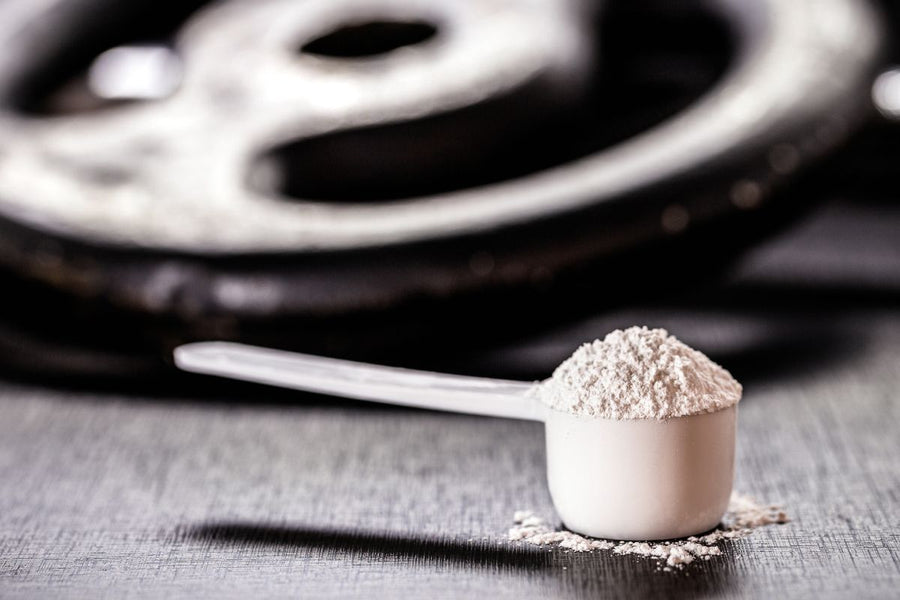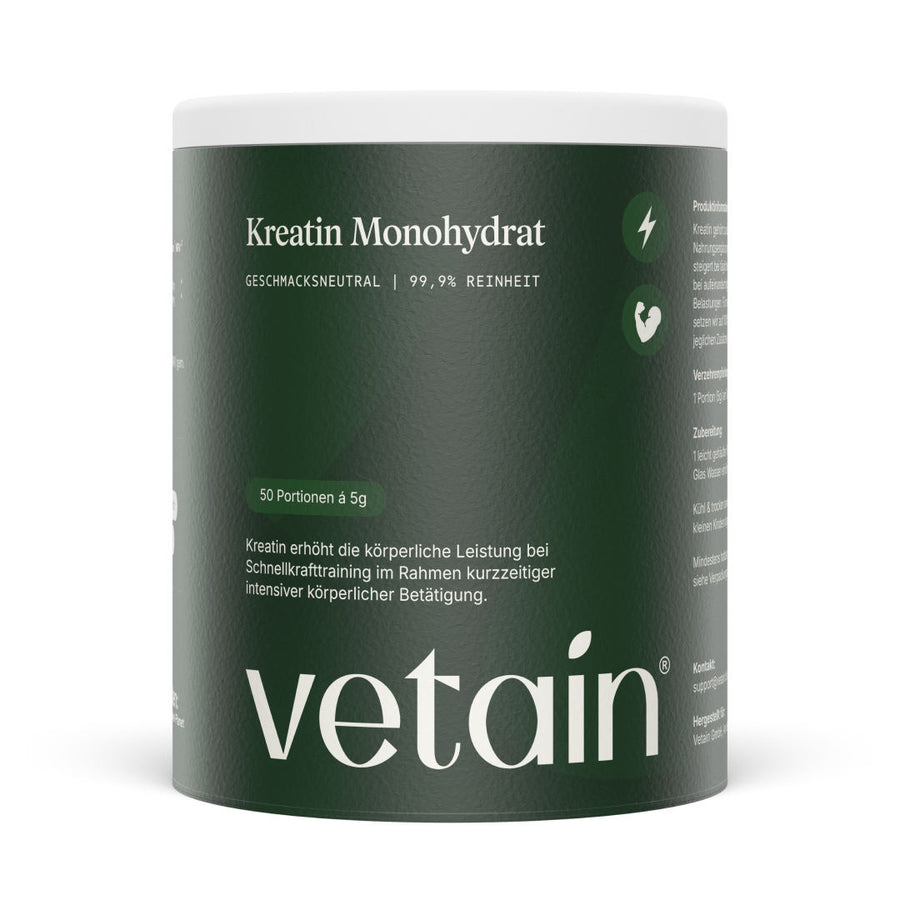For many people who are active in sports, creatine has become part of their daily supplement routine. But a lot of folks don’t actually know how much creatine they should take. You often hear about 3–5 grams. But is that right? How much creatine per kg do you really need, and how many grams of creatine per day is too much? And what on earth is a loading phase?! So many questions – and we’ve got the answers!*
Your takeaways: How much creatine per kg?
To get the best benefits from creatine, it’s important to take it regularly and in the right dosage.
In the loading phase you need about 0.3 g per kg of body weight, while in the maintenance phase you need about 0.03 g per kg.
Some people follow the cycle loading phase – maintenance phase – break, while others take creatine continuously.
Too much creatine can cause gastrointestinal discomfort, but 3–5 g per day is generally considered unproblematic.
How much creatine per kg is needed is not dependent on whether you’re currently aiming to build muscle, lose weight, or maintain your weight.
Creatine effects
Before we really dive in, let’s quickly go back to basics: What does creatine do? For creatine, reliable information currently exists mainly in the area of sports performance. However, the potential influence of creatine on different areas of the body is also being researched:
Brain
Nervous system
Mental health
Immune system
Muscles
The effect in sports is especially interesting for many and the reason why they want to take creatine. You can think of creatine in the body as an energy store or energy supplier by helping regenerate ATP: creatine increases physical performance during high-intensity, short-duration exercise when 3 g are taken daily. Put simply, creatine gives your muscles more energy so they can deliver better performance.
By the way: Creatine without exercise won’t improve your performance, because without training you won’t get stronger. Creatine isn’t a miracle cure. Want to know what creatine actually is? Check out this article: What is creatine?
But how much creatine per kg do you need to benefit?
How much creatine per kg – your overview
If you want to know how much creatine per kg you should take daily, you first need to understand that (from a sports science perspective) creatine supplementation has two phases: loading phase and maintenance phase.
The daily dosage differs between these two phases. The dose is not dependent on whether you plan to build muscle, lose weight, and so on.
Loading phase: How much creatine per kg during loading?
When you start taking creatine, you can optionally do a loading phase for about 5–7 days. In this phase you actively “fill” your creatine stores with a higher dose so you notice effects as quickly as possible.
Recommended dose: 0.3 g of creatine per kg of body weight
Depending on body weight, total daily amounts of 15–30 g of creatine are possible.
Maintenance phase: How much creatine per kg during maintenance?
After loading comes the maintenance phase. Your creatine stores are now filled and just need to be maintained.
Recommended dose: 0.03 g of creatine per kg of body weight
Depending on body weight, total daily amounts of 1.5–3 g of creatine are possible.
Most people don’t base their daily dose on body weight, but simply follow the standard recommendation of 3–5 g of creatine per day.
There’s a third, lesser-known phase: the break. As you might guess, you pause creatine during this time. More on that later.
For completeness:
How much creatine per kg during the break? 0 g per kg!
Now you’re in the know. ;)
Did you know?
The loading phase is not strictly necessary! You can start directly with the maintenance phase — your stores will still fill up gradually. It just takes a bit longer. After a maximum of 4 weeks, your creatine stores will be full with this method too!
%-split_content-%
Men and women
Many assume there are dosing differences for women vs. men. That’s not true! The same dosing guidance applies to both:
How much creatine per day for women? Loading 0.3 g/kg | Maintenance 0.03 g/kg
How much creatine per day for men? Loading 0.3 g/kg | Maintenance 0.03 g/kg
Creatine dosages for men may simply appear higher because men often (not always!) weigh more than women, resulting in higher total amounts. Per 1 kg, it’s exactly the same!
How much creatine per day – calculator
Okay, I know — for many of us math class was a while ago, and even opening the calculator app can feel like too much sometimes. So here are the recommended creatine amounts calculated for different weight classes:
With that, questions like “How much creatine at 80 kg?” or “How much creatine at 70 kg?” should be fully answered. What happens if you take more creatine?
What happens if you take too much creatine?
First we need to define how much creatine per kg is too much. In general, doses of 3–5 g per day are considered safe — how much that is per kg depends on how much you weigh.
If you take more than this amount, you’ll not get additional benefits. In other words, taking more than 3–5 g doesn’t lead to better effects or more strength. So it’s basically a waste of money. Better invest in a tasty protein bar:
%-product_content-%
Also, a too-high creatine dose can cause gastrointestinal symptoms (nausea, stomach pain, etc.). While side effects from creatine are generally rare, very high doses can cause reactions.
How do you take creatine?
We now know how much to take. But what’s the best way to take creatine supplements? We already mentioned the cycle of loading – maintenance – break. This is also called a creatine “cycle”. After 5–7 days of loading, you do a maintenance phase of about 6–8 weeks. The following break lasts a few weeks (usually 2–4).
Why is this break important? Can’t you just take creatine continuously? The current study situation isn’t crystal clear — we don’t know for sure yet. The break is intended to “reset” the body so it can respond better again. Just like caffeine can lose its wake-up effect over time for many people, some feel something similar with creatine. Others choose not to take a break and use creatine continuously.
By the way: your stores drop back to baseline about 4 weeks after stopping creatine.
Another key point: During loading and maintenance, creatine should really be taken every day — not just on training days. You want your stores to stay full.
Tips for taking creatine:
Creatine comes as powder or capsules. The most common form is creatine monohydrate powder. It’s easy to dose and take.
You can mix the powder with water or add it to a protein shake, your porridge, or a smoothie. Pair your creatine with a good portion of carbohydrates — this can support uptake.
If you’re prone to stomach issues, take creatine with a meal. You can also split your daily amount into 2–3 smaller doses. This often improves tolerance.
Remember to drink plenty of water! Creatine can draw water into your muscles, which increases your fluid needs.
Looking for more tips on timing your supplementation? We got you!
Did you know creatine is also found in foods like meat?
Quiz time: How much pork would you need to eat to get 5 grams of creatine (the commonly recommended amount)?
Answer: About 1 kg.
Oh wow — now I see why even many meat eaters prefer supplementing creatine.
Conclusion
Creatine can definitely be useful — but only if you take it in the right dose. Luckily, you now know how much creatine per kg the pros recommend. Nothing stands in the way of your creatine journey now.
If you want to read more about creatine, here are a few of our articles — you’ll be a creatine pro in no time:
Is creatine worth it?
Creatine intake
Don’t be surprised if these articles also touch on how much creatine per day or per kg is recommended. As they say — repetition is the mother of learning!
PS: Keep in mind there’s a lot of misinformation on the internet about how much creatine per kg you need. Don’t believe everything you read — rely on trustworthy sources!
References
Kreider, R. B. et al. (2017). International Society of Sports Nutrition position stand: safety and efficacy of creatine supplementation in exercise, sport, and medicine. In: Journal of the International Society of Sports Nutrition, 14(1).
Nebel, R. (2002). Creatin im Sport - Ergogenes Supplement? In: Deutsche Zeitschrift für Sportmedizin, 53(7+8)
Swiss Sports Nutrition Society (2023). Supplementguide. A-Supplemente: Performance Supplement.
If you have any questions, feel free to email me — I’m happy to hear from you! :)
The information in this article does not replace individual medical or nutritional advice.















 9 Min
9 Min
 Zuletzt aktualisiert am 14.09.2025
Zuletzt aktualisiert am 14.09.2025





